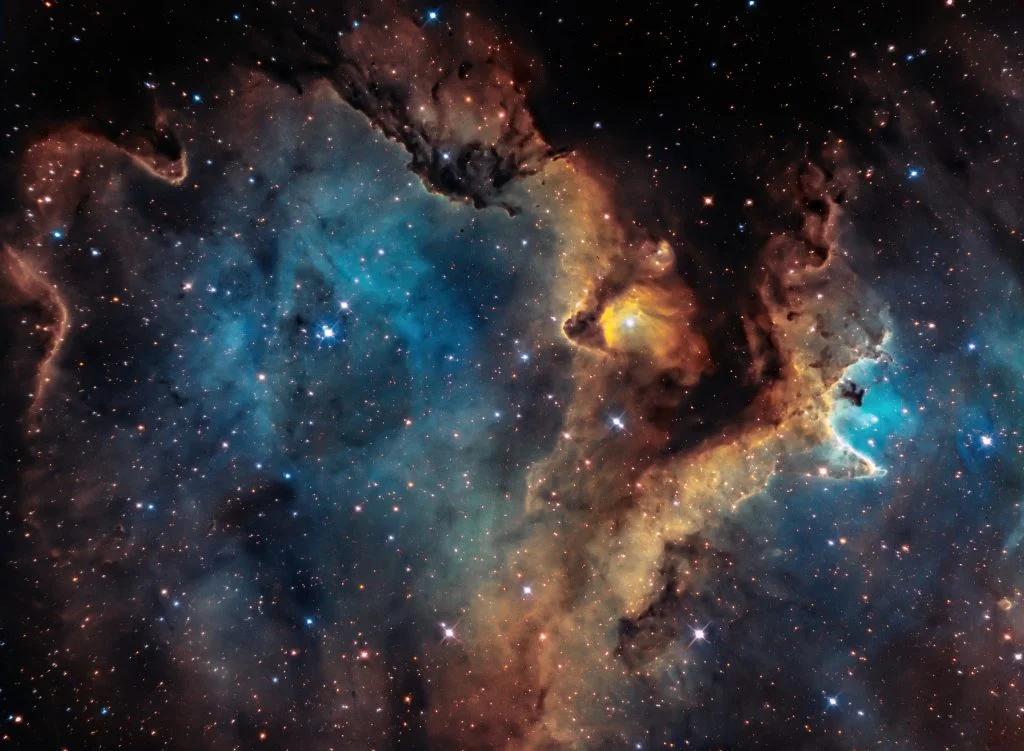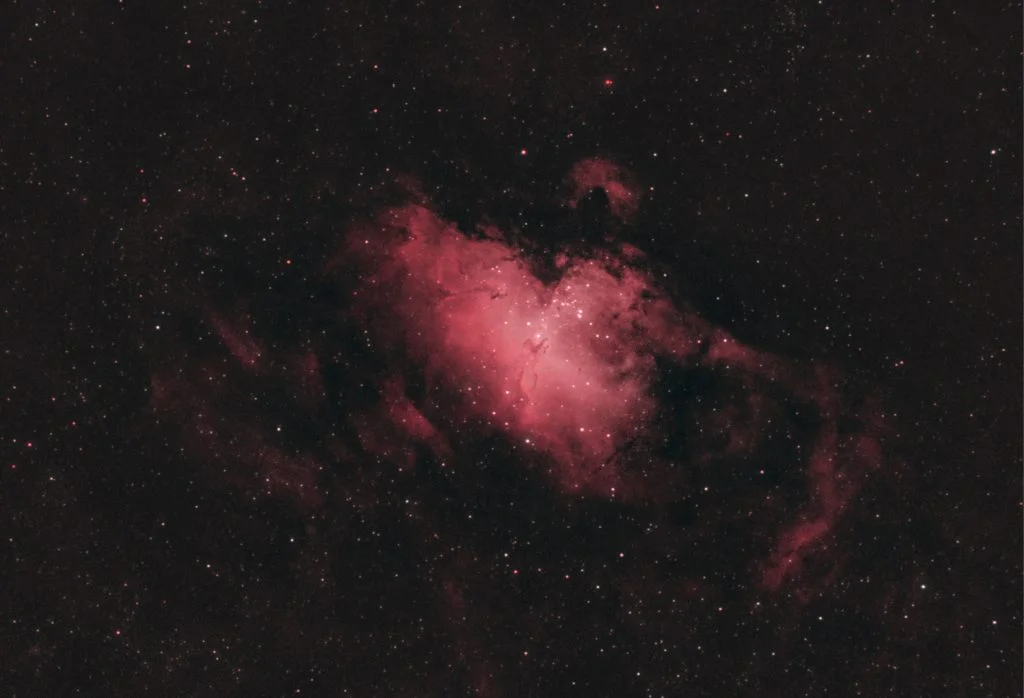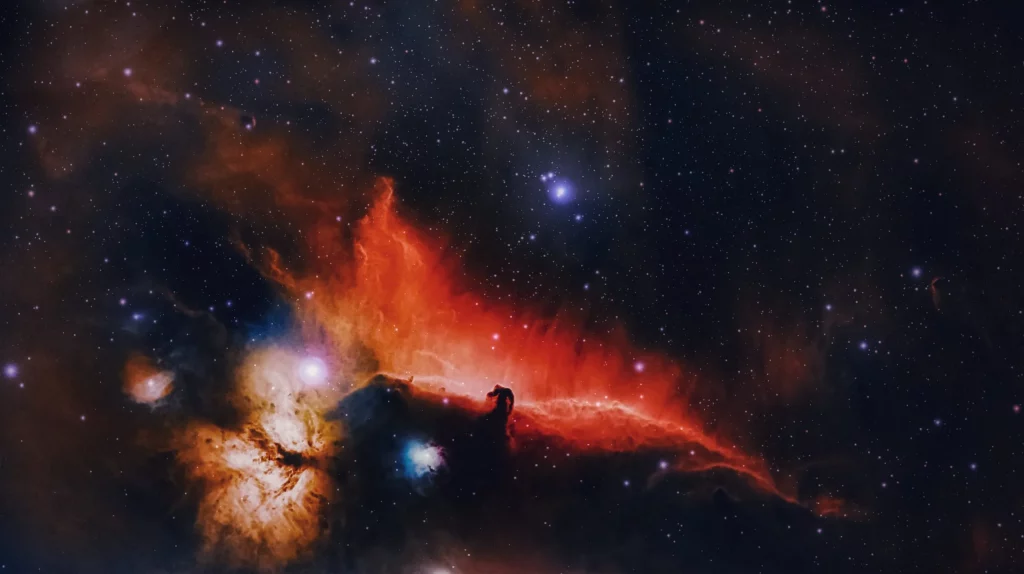Have you ever tried stargazing and a mosquito buzzing by your ear, distracting you? Happens to the best of us. Once, while I was observing the night sky, waiting for a supernova to show its magnificent glow, a raccoon decided to have a dance party on my picnic spread. It’s a sign, I thought! Even Mother Nature gets excited about cosmic explosions.
Supernovae might not always be as up-close and personal as my furry intruder, but they’re infinitely more dazzling. Curious about these stellar wonders? Stick around for some fascinating supernova facts and myths.
We are made of starstuff
Carl Sagan
Supernova Facts
Alright, pull up a chair, my friend. Before we dive in, be sure that you have your pop corn in place, and let’s embark on this starlit journey together. Take notes because there is a quiz waiting for you at the end of the article.
- A supernova signifies a star’s colossal explosion, representing the most massive explosion occurring in space.
- Primarily, supernovae are classified into two main categories: Type I and Type II.
- Type I supernovae are characterized by the absence of hydrogen lines in their spectra, contrary to Type II supernovae.
- A supernova possesses the capability to momentarily outshine an entire galaxy.
- The explosion propels a substantial portion of the star’s matter at velocities reaching 30,000 km/s.
- The Crab Nebula remains as the residue of a supernova witnessed in 1054 AD.
- The energy emission from a supernova explosion can surpass the total energy produced by our sun throughout its existence.
- Prior to a supernova event, a star’s core might attain temperatures scaling to several billion degrees.
- Supernovae are instrumental in the transmission of elements forged by stars into the interstellar medium.
- Elements located on Earth and within our bodies predominantly originate from star cores, disseminated into space by supernovae.
- The iron content in our blood is a product of supernova explosions.
- SN 1987A marked a notable supernova occurrence in the Large Magellanic Cloud, documented in 1987.

- The latest supernova observed within our Milky Way galaxy was documented as Kepler’s supernova in 1604.
- Owing to their extraordinary brilliance, most supernovae observations occur in distant galaxies.
- The aftermath of a supernova explosion could lead to the formation of neutron stars and black holes.
- In binary systems, white dwarf stars undergoing material accumulation from companion stars can initiate a supernova.
- The Supernova Early Warning System (SNEWS) operates as a network dedicated to providing premature alerts concerning potential supernovae in our galaxy.
- In the universal realm, supernovae are essential as they facilitate star creation processes by condensing gas and dust through their explosive shockwaves.
- Walter Baade and Fritz Zwicky introduced the term “supernova” during the 1930s.
- Studying supernovae aids astronomers in gauging the distances to various galaxies and understanding the universe’s expansion rhythm.
- Supernovae have the potential to generate gravitational waves alongside disturbances in the fabric of spacetime.
- Residual traces of supernovae can remain perceptible for millennia following the initial explosion.
- While the luminosity of a supernova diminishes over time, it can maintain visibility for an extended period of months.
- The underlying mechanism of core collapse is attributed to the occurrence of Type II, Type Ib, and Type Ic supernovae.
- The Chandrasekhar limit delineates the ultimate mass threshold that a white dwarf may attain prior to initiating a supernova, estimated at approximately 1.44 times the sun’s mass.
- Binary star configurations contribute to the genesis of Type Ia supernovae, facilitated by the transfer of mass from one stellar body to a white dwarf.
- Supernovae can manifest immense energy levels, sufficiently potent to transiently eclipse the collective stellar luminosity of their resident galaxies.

- Novae and supernovae exhibit distinct characteristics, with novae being comparatively less vehement explosive occurrences.
- The convergence of two white dwarfs can precipitate certain supernova events.
- Astronomers employ Type Ia supernovae as reliable “standard candles” for universe mapping due to their consistent luminosity profiles.
- Supernovae are capable of emitting neutrinos, exceedingly minute subatomic particles almost devoid of mass.
- The neutrinos originating from SN 1987A were perceived on Earth prior to the arrival of its visible light.
- Supernovae contribute to the synthesis of substantial elements such as gold, silver, and uranium.
- The extensive energy discharged by supernovae can influence the genesis of new stellar bodies by consolidating spatial clouds of gas and dust.
- Certain supernovae are correlated with gamma-ray bursts, ranking among the universe’s most intense energetic phenomena.
- Amateur astronomers occasionally contribute to the discovery of supernovae.
- A Type Ia supernova manifestation is estimated to recur once every 300 years within the Milky Way.
- The discovery of one of the remotest supernovae, dubbed SN 1997ff, occurred in the Hubble Deep Field.
- The 1054 AD supernova, culminating in the Crab Nebula, was historically observed by various civilizations, including the Chinese and Arabs.
- Supernova 2006gy, identified in 2006, ranks among the most luminous supernovae ever detected.
- Supernova-generated shockwaves can induce the formation of new stellar entities.
- Some residual supernova fragments manifest as spectacular and complex nebulae formations, exemplified by the Veil Nebula.

- Supernova observations were instrumental in unveiling the existence of dark energy, a cryptic force propelling universal expansion.
- Supernovae exert transformative impacts on the adjacent interstellar mediums, giving rise to formations termed superbubbles.
- Supernovae facilitate the production of cosmic rays, high-velocity particles that can permeate the Earth’s atmosphere.
- Supernova frequency within a galaxy can offer valuable insights regarding the galaxy’s stellar evolutionary pace.
- Initial luminosity levels of supernovae are influenced by the progenitor stars’ mass.
- Supernovae observations serve as instrumental tools for validating theoretical constructs related to universal evolution and attributes.
- Astronomical instruments operating across diverse wavelengths, ranging from radio to X-rays, are utilized for scrutinizing supernovae and their residual traces.
- Supernovae originating from massive stars culminate in core collapses, leading to the emergence of either neutron stars or black holes.
Supernova Myths

There are many myths and facts about supernova but let’s dive into the fascinating world of supernovae and separate some common misconceptions from the truths.
- Supernovae are the death of stars.
Actually, while a supernova does mark a star’s dramatic end, not all stars go supernova. Only the really massive ones do. Other stars have different fates, like slowly cooling down or remaining stable. - A supernova can go off in our sun and destroy Earth.
Rest easy! Our sun doesn’t have the mass to explode as a supernova. It’ll expand, shed layers, and become a white dwarf long before anything that explosive happens. - Supernovae are just larger versions of novae.
Despite their similar names, they’re quite different. Novae involve a surface explosion on a white dwarf, while supernovae are the grand finale of a massive star’s life. - Supernovae only happen once in a galaxy’s lifetime.
While they’re rare, they’re not that rare. In a galaxy like ours, you can expect a supernova every 50 to 100 years or so. - All supernovae shine with the same brightness.
Not quite. Their brightness can vary a lot. However, a certain type, Type Ia supernovae, are consistently bright, helping astronomers measure cosmic distances.
No products found.
Supernova FAQ

Let’s try to answer some of the most common questions you find online when you search for this topic.
- Can a supernova destroy a galaxy?
Picture a massive fireworks display in the sky. Impressive, right? But not enough to light up the entire night sky. That’s kind of how supernovas are with galaxies. They’re mind-blowingly powerful, but a whole galaxy is way too vast for one to wipe out. - Can a supernova destroy Earth?
Think of a supernova as that neighbor’s party that’s just too loud. It won’t break into your house (Earth in this case), but if it’s close enough, it sure can make things uncomfortable, like messing with our ozone. Thankfully, there will be no raucous supernova parties nearby anytime soon! - What is the closest supernova to Earth?
Ever heard of SN 1987A? Not the name of a new pop band, but the title of the closest supernova we’ve spotted! It’s in a neighboring galaxy called the Large Magellanic Cloud. Still, it’s a safe 168,000 light-years away. - Will the sun go supernova?
Our sun is like that reliable friend who won’t go too wild. It doesn’t have the ‘umph’ to go supernova. It’ll mature gracefully, becoming a red giant and then mellowing down to a white dwarf. - How old is the Crab Nebula?
The Crab Nebula is like a historic monument in our sky. Born from a supernova people saw in 1054 AD, it’s currently 969 years old in 2023. Time flies, doesn’t it?
Supernova Quiz

I hope you took some notes and are ready for a supernova quiz. If you get everything wrong, you might just sparkle… but not like a star!
Conclusion
Isn’t the universe a riot? Supernovas are basically stellar firework shows, except a gazillion times bigger (don’t quote me on that math).
If stars can have such dramatic exits, shouldn’t we appreciate our less explosive, coffee-fueled mornings? What do you think? If you were a star, how would you want to go out? Sparkle or supernova?
Source Used For This Article

